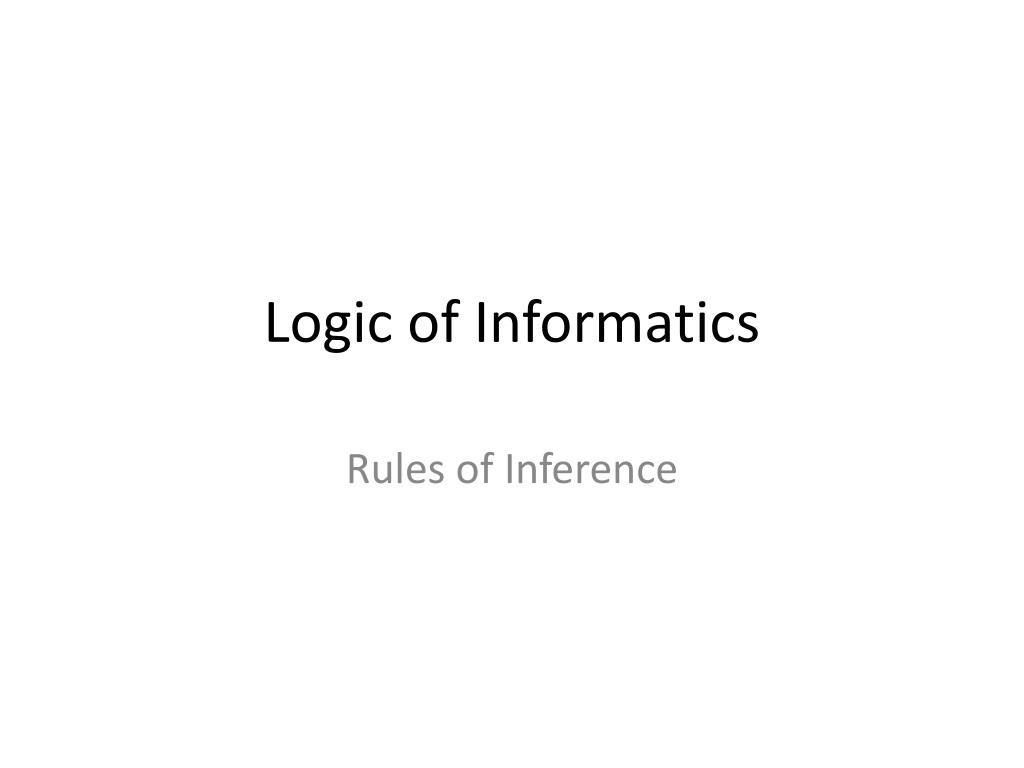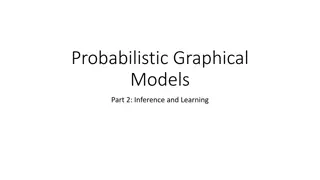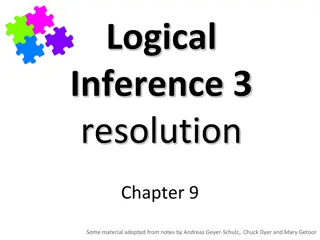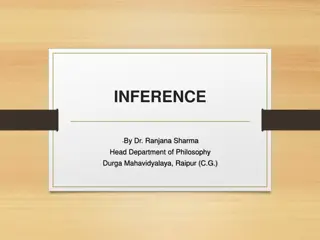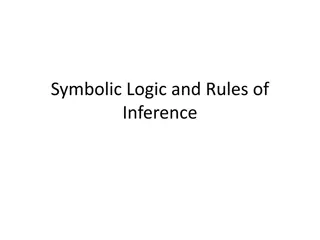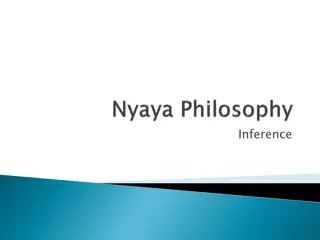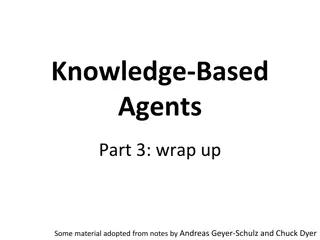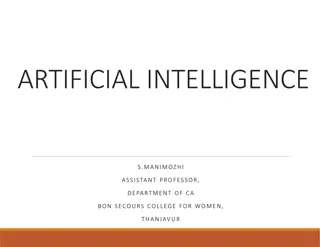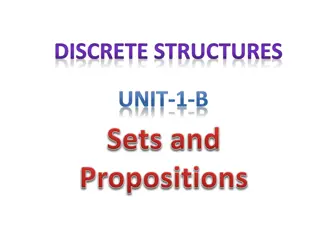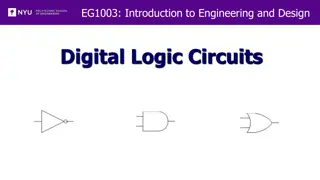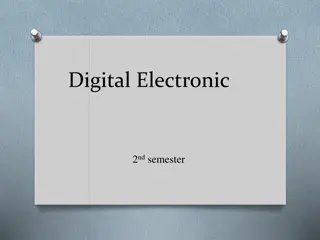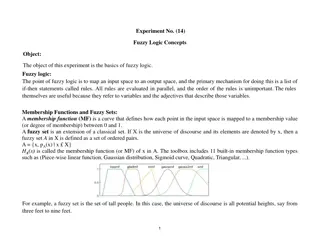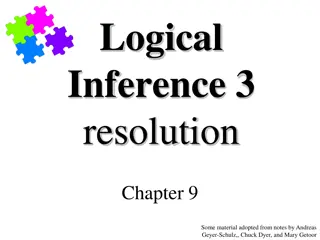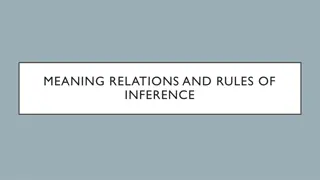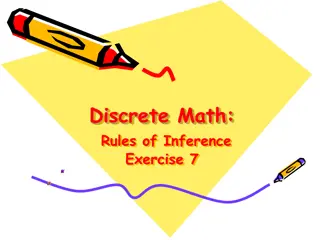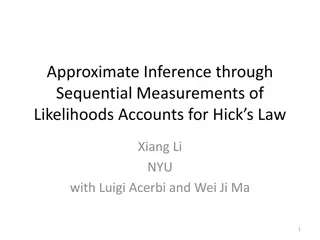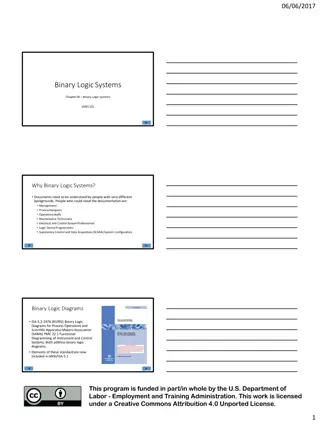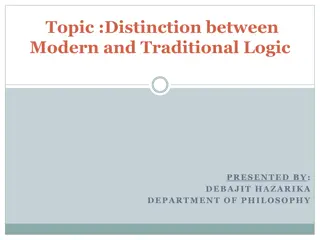Understanding Rules of Inference in Logic
Dive into the world of logic with this detailed exploration of rules of inference. Learn about different types of arguments, such as Modus Ponens and Modus Tollens, and understand how to determine the validity of an argument. Discover the purpose of rules of inference and unravel the logic behind constructing valid arguments.
Download Presentation

Please find below an Image/Link to download the presentation.
The content on the website is provided AS IS for your information and personal use only. It may not be sold, licensed, or shared on other websites without obtaining consent from the author. Download presentation by click this link. If you encounter any issues during the download, it is possible that the publisher has removed the file from their server.
E N D
Presentation Transcript
Logic of Informatics Rules of Inference
Last Lecture Converse Inverse Contrapositive Tautology Contradiction
What is an argument? An argument is a sequence of statements or premises that end in a conclusion. Ex: If I jump I will fall I jump Therefore, I will fall p q p This argument has the form: q
Another Example Ex: Premise: If I eat too much, my stomach will be hurt Premise: My stomach doesn t hurt Conclusion: Therefore, I don t eat too much p q p q q This argument has the form: p
The purpose of rules of inference We use rules of inference to construct valid arguments. A valid argument is one in which it is not possible for the conclusion to be false if the premises are true. The argument is valid iff the truth of all premises implies the conclusion is true
How to determine the validity of argument? , , , p p n p The argument form with premises 1 2 and conclusion q n ) ( is valid when is a tautology p p p q 1 2
The Rules of Inference - Modus Ponens p q p q If I am late, my teacher is angry to me I am late Therefore, my teacher is angry to me
The Rules of Inference - Modus Tollens p q q p If grass is blue, then trees are blue Trees are not blue Therefore, grass is not blue
The Rules of Inference - Hypothetical Syllogism p q q r p r If today is raining, then we are late If we are late, then our teacher will be angry Therefore, if today is raining then our teacher will be angry
The Rules of Inference - Disjunctive Syllogism p q p q q p OR p q My wallet is in my pocket or left behind at home No wallet in my pocket Therefore, my wallet left behind at home
The Rules of Inference - Conjunction p q p q He takes Discrete Mathematics Lecture He repeats Algorithms Lecture Therefore, he takes Discrete Mathematics and repeats Algorithms
The Rules of Inference - Addition p q OR p q p q ? = I like tea, ? = I like coffee I like tea Therefore, I like tea or coffee
The Rules of Inference - Simplification p q p q OR p q I am clever in mathematic and computer science Therefore, I am clever in mathematic
The Rules of Inference - Dilemma p p q q r r r Either we increase the price or we decrease the quality. If we increase the price, sales will slump. If we decrease the quality, sales will slump. Therefore, sales will slump.
Exercise 1 Determine whether the following argument is valid / Invalid a). P (Q R) R P Q b). P (Q R) Q (P R) P R
Exercise 2 One day, you want to go to college and realized that you do not wear glasses. Having to remember, there are some facts that you make sure the truth: 1. If the glasses are on the kitchen table, then I would have seen it as breakfast. 2. I read the newspaper in the living room or I read it in the kitchen. 3. If I read the newspaper in the living room, then surely put my glasses on the coffee table. 4. I do not see my glasses at breakfast time. 5. If I read a book in bed, then put my glasses on the bedside table. 6. If I read the newspaper in the kitchen, then my glasses are on the kitchen table. s p p q r s r t q u w Based on these facts, prove / show that the glasses left on the coffee table!
Exercise 3 Prove the validity of the following arguments using the rules of inference! p q (p q) r r
